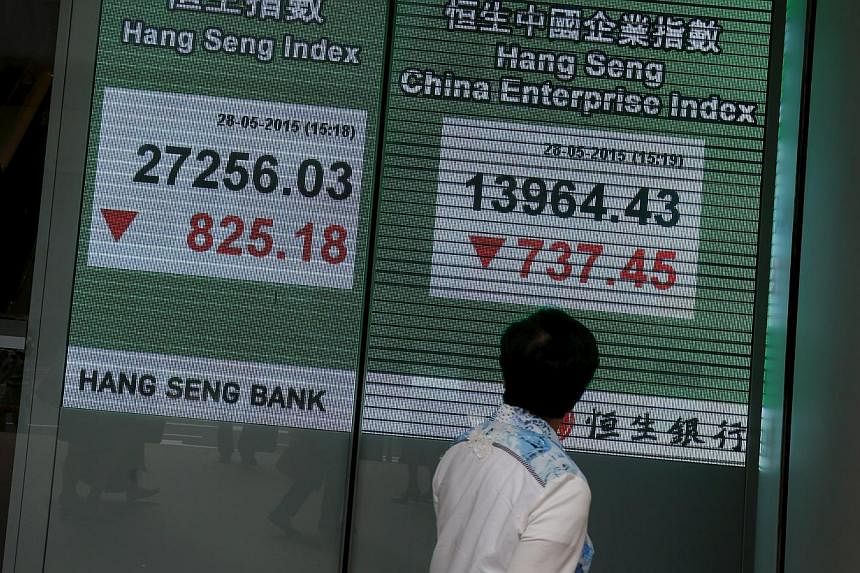HONG KONG (Bloomberg) - Stephen Qin, a 28-year-old office worker in northern China, traveled 1,000 miles and set up an account in Hong Kong to trade Chinese stocks he could have bought at home.
The money of thousands of mainland investors is doing a similar round trip, flowing into brokerages in Hong Kong and then returning to China via share purchases through the city's stock connect with Shanghai.
Why? It's cheaper.
Discounts on trading commissions, lower margin-finance charges - even reimbursement for airfares - make the city's securities firms look like a bargain compared with those on the mainland. Chinese investors can also borrow higher amounts for trading than at home.
"I've done my research and realized it's quite a fantastic opportunity to trade stocks with a Hong Kong brokerage," Qin, who lives in Jincheng in Shanxi province, said by phone. "It's definitely cheaper to trade with a Hong Kong brokerage now."
As mainland brokers tighten margin financing amid increased regulatory scrutiny, Hong Kong securities firms are finding a niche catering to Chinese investors. Amid the world's biggest stock rally, a 141 per cent one-year gain, the business presents a means to compete with bigger Chinese rivals who have been expanding in the city.
Bright Smart Securities and Commodities Group Ltd., where Qin does his trading, has about 15,000 accounts belonging to mainlanders, and about half of their money is now invested in A shares traded in Shanghai, said Nelson Chan, chief executive officer. Business from mainlanders has increased 10 times since the opening of the stock connect, he said.
The brokerage promises to reimburse as much as HK$10,000 (S$1,740) for travel costs to Hong Kong, with advertisements that read: "We promise it's cheaper than in China." It's also offering commission-free trading and cheaper loans for margin financing. At least a dozen other Hong Kong brokerages, including Luk Fook Financial Services Ltd. and Chief Securities Ltd., have been offering various similar incentives. About a quarter of the 449 brokerages doing business in Hong Kong are approved to trade mainland A shares.
As many as 40 mainland brokerages in Hong Kong may be channeling mainlanders' money into A shares from accounts in the city, though they're less aggressive than Bright Smart in offering incentives, said Jeffrey Chan, chairman of Hong Kong Securities Association Ltd.
The brokerage business of the Hong Kong unit of Bank of China Ltd. is waiving fees and offering cheaper margin loans for some customers, while Guotai Junan International Holdings Ltd., Haitong International Securities Group Ltd. and Shenwan Hongyuan HK Ltd. are also providing cheaper loans without waiving commissions.
Investors in Hong Kong, including mainland visitors, have put 153 billion yuan (S$33.31 billion) into Shanghai-traded equities since China began allowing purchases through the link in November.
Charles Li, CEO of Hong Kong Exchanges and Clearing Ltd., said he was unaware of how much money originated in Hong Kong or how much was round-tripping from China.
"These are just investors in Hong Kong, and I don't care how they've got here," he said in an interview. "Why I would single them out?"
China's foreign-exchange rules cap the maximum amount of yuan that individuals are allowed to send abroad at US$50,000 each year. Most of the mainlanders seeking to open accounts already have money deposited in Hong Kong bank accounts, said Chan of Bright Smart.
While brokerages in China charge interest rates of more than 8 per cent for margin financing, the levels are lower in Hong Kong. Bright Smart's rate is 7 per cent after recently being as low as 5.5 per cent. In Hong Kong, firms had been offering loans to cover as much as 80 per cent of the cost of share purchases, compared with 70 per cent in China, Chan said.
As of June 1, Bright Smart lowered the level to 65 per cent and mainland firms were offering between 60 per cent and 70 per cent, he said.
"Our main target for China is to expand our customer base," Chan said.
A second link, to the Shenzhen Stock Exchange, was due by the end of this year.
With his account set up across the border, Qin, the Shanxi resident, can now place orders from his home computer in China. Recently he bought China Construction Bank Corp. and China Merchants Bank Co., and has invested 1 million yuan, including borrowed money, in A shares.
"I can make more money if I can borrow more," said Qin. "That's why I chose Hong Kong."

